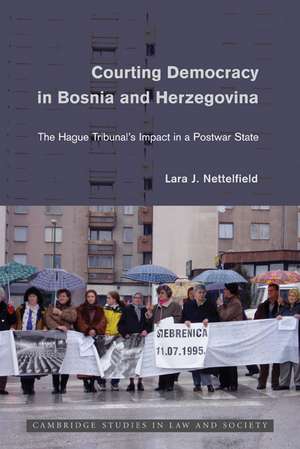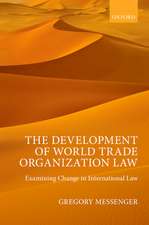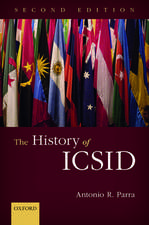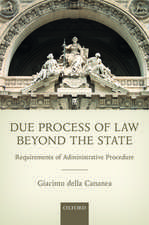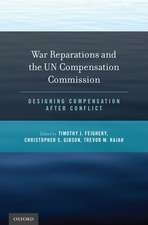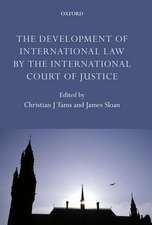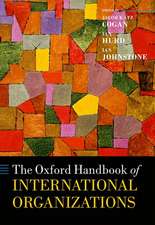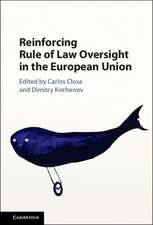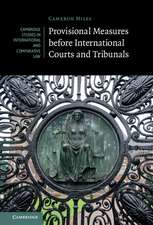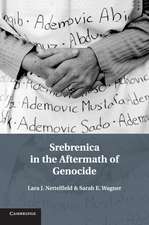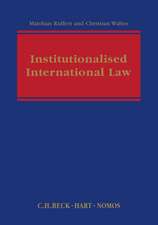Courting Democracy in Bosnia and Herzegovina: Cambridge Studies in Law and Society
Autor Lara J. Nettelfielden Limba Engleză Hardback – 16 mai 2010
| Toate formatele și edițiile | Preț | Express |
|---|---|---|
| Paperback (1) | 318.80 lei 6-8 săpt. | |
| Cambridge University Press – 28 oct 2012 | 318.80 lei 6-8 săpt. | |
| Hardback (1) | 775.44 lei 6-8 săpt. | |
| Cambridge University Press – 16 mai 2010 | 775.44 lei 6-8 săpt. |
Din seria Cambridge Studies in Law and Society
-
 Preț: 233.96 lei
Preț: 233.96 lei -
 Preț: 177.28 lei
Preț: 177.28 lei -
 Preț: 217.08 lei
Preț: 217.08 lei - 11%
 Preț: 555.04 lei
Preț: 555.04 lei -
 Preț: 162.09 lei
Preț: 162.09 lei -
 Preț: 290.77 lei
Preț: 290.77 lei -
 Preț: 169.28 lei
Preț: 169.28 lei -
 Preț: 217.44 lei
Preț: 217.44 lei -
 Preț: 318.50 lei
Preț: 318.50 lei - 9%
 Preț: 694.92 lei
Preț: 694.92 lei - 9%
 Preț: 661.47 lei
Preț: 661.47 lei -
 Preț: 168.85 lei
Preț: 168.85 lei -
 Preț: 289.76 lei
Preț: 289.76 lei -
 Preț: 185.40 lei
Preț: 185.40 lei - 9%
 Preț: 695.23 lei
Preț: 695.23 lei -
 Preț: 289.76 lei
Preț: 289.76 lei -
 Preț: 176.91 lei
Preț: 176.91 lei -
 Preț: 236.96 lei
Preț: 236.96 lei -
 Preț: 207.99 lei
Preț: 207.99 lei -
 Preț: 274.60 lei
Preț: 274.60 lei -
 Preț: 289.66 lei
Preț: 289.66 lei -
 Preț: 277.62 lei
Preț: 277.62 lei -
 Preț: 292.93 lei
Preț: 292.93 lei - 14%
 Preț: 718.60 lei
Preț: 718.60 lei -
 Preț: 389.68 lei
Preț: 389.68 lei -
 Preț: 372.95 lei
Preț: 372.95 lei -
 Preț: 324.90 lei
Preț: 324.90 lei - 14%
 Preț: 720.24 lei
Preț: 720.24 lei -
 Preț: 372.95 lei
Preț: 372.95 lei -
 Preț: 376.30 lei
Preț: 376.30 lei - 11%
 Preț: 684.80 lei
Preț: 684.80 lei - 14%
 Preț: 833.32 lei
Preț: 833.32 lei -
 Preț: 425.97 lei
Preț: 425.97 lei - 11%
 Preț: 689.80 lei
Preț: 689.80 lei - 14%
 Preț: 724.35 lei
Preț: 724.35 lei -
 Preț: 370.83 lei
Preț: 370.83 lei -
 Preț: 419.37 lei
Preț: 419.37 lei - 14%
 Preț: 722.37 lei
Preț: 722.37 lei -
 Preț: 305.88 lei
Preț: 305.88 lei -
 Preț: 395.61 lei
Preț: 395.61 lei - 14%
 Preț: 721.72 lei
Preț: 721.72 lei - 14%
 Preț: 721.06 lei
Preț: 721.06 lei - 11%
 Preț: 458.04 lei
Preț: 458.04 lei
Preț: 775.44 lei
Preț vechi: 901.67 lei
-14% Nou
Puncte Express: 1163
Preț estimativ în valută:
148.47€ • 152.30$ • 125.00£
148.47€ • 152.30$ • 125.00£
Carte tipărită la comandă
Livrare economică 26 februarie-12 martie
Preluare comenzi: 021 569.72.76
Specificații
ISBN-13: 9780521763806
ISBN-10: 0521763800
Pagini: 352
Ilustrații: 19 b/w illus. 1 map 12 tables
Dimensiuni: 158 x 235 x 23 mm
Greutate: 0.59 kg
Editura: Cambridge University Press
Colecția Cambridge University Press
Seria Cambridge Studies in Law and Society
Locul publicării:New York, United States
ISBN-10: 0521763800
Pagini: 352
Ilustrații: 19 b/w illus. 1 map 12 tables
Dimensiuni: 158 x 235 x 23 mm
Greutate: 0.59 kg
Editura: Cambridge University Press
Colecția Cambridge University Press
Seria Cambridge Studies in Law and Society
Locul publicării:New York, United States
Cuprins
1. Assessing the impact: Bosnia and Herzegovina and the International Criminal Tribunal for the former Yugoslavia (ICTY); 2. Crafting the polity: transitional justice and democratization in Bosnia and Herzegovina; 3. An unfavorable context: war, Dayton, and the ICTY; 4. Expanding the norm of accountability: Srebrenica's survivors, collective action, and the ICTY; 5. Making progress with few resources: civil society and the ICTY; 6. Narrative and counter-narrative: the case of the Čelebići trial; 7. From the battlefield to the barracks: the ICTY and the Bosnian armed forces (AFBIH); 8. Localizing war crimes prosecutions: the Hague to Sarajevo and beyond; 9. Conclusion.
Recenzii
Reviews of the hardback: 'This book is essential reading for anyone interested in war crimes tribunals and their place in transitional justice. Nettelfield's wide and thorough research in the literature and on the ground in Bosnia and Herzegovina make this work stand out in a field already heavily populated. It represents a well balanced and realistic assessment of the record of the International Criminal Tribunal for the former Yugoslavia.' Richard Goldstone, former chief prosecutor, United Nations International Criminal Tribunals for Yugoslavia and Rwanda
'Elegantly written and drawing on years of meticulous empirical research, Courting Democracy in Bosnia and Herzegovina is a major contribution to theoretical and policy debates on the role of international justice institutions. Nettelfield robustly challenges conventional critical assessments of the International Criminal Tribunal for the Former Yugoslavia (ICTY) and in so doing, changes forever the terms of the discussion about the impact of the ICTY in Bosnia-Herzegovina. Should be required reading in courses on human rights, international criminal law and political transitions in post-conflict settings.' Richard A. Wilson, Gladstein Chair of Human Rights and Director of the Human Rights Institute, University of Connecticut
'This work is elegant in its rigor; lively in its tone; and uplifting in its spirit. Nettelfield gracefully moves us beyond turgidly contemptuous or blindly enthusiastic assessments of the relevance of international criminal law. She charts the field's role in post-conflict transition – a modest role, to be sure, and certainly a nuanced one, but also one that fosters democratic development. The book is a must-read for anyone concerned with Bosnia, transitional justice, and the role of law in life. A tour-de-force!' Mark A. Drumbl, Class of 1975 Alumni Professor and Director, Transnational Law Institute, Washington and Lee University School of Law
'Friends of international justice will welcome this balanced, methodologically rigorous assessment of popular responses to the ICTY in the Western Balkans … With its nuanced presentation of the Tribunal's impact, this work amply identifies missteps and pitfalls while providing gracious encouragement to proponents of international jurisprudence.' Robert Donia, University of Michigan
'Lara Nettelfield has masterfully documented and analyzed the true impact of the International Criminal Tribunal for the Former Yugoslavia on Bosnian society since 1993. She challenges conventional wisdom by demonstrating the tribunal's modest but largely positive contribution to the democratic development of Bosnia and Herzegovina, including the introduction of new social movements for accountability. This book slays a few dragons and introduces refreshing clarity to a very challenging subject.' David Scheffer, Northwestern University School of Law, and former US Ambassador for War Crimes Issues (1997–2001)
'With a soft yet firm voice, backed by exceptionally thorough research, Nettelfield argues that the … [ICTY] has helped form attitudes and institutions essential to a democratic outcome in war-ravaged Bosnia. It is not an easy argument to make given the impediments to the tribunal's success, its own deficiencies, and the headwind of skepticism coming from the analytic community over the effectiveness of such tribunals. All of this she accepts, but then, thanks to a carefully crafted superstructure drawing together different theoretical literatures and … ten years of exacting research … [she] makes a compelling case for the ICTY's larger positive effects. Whether directly, indirectly, or sometimes negatively, it has fostered new assumptions about 'justice and accountability' among Bosnians, stirred the formation of civil-society groups determined to fight for these things, and helped create local court institutions capable of carrying on the work.' Robert Legvold, Foreign Affairs
'This study of the influence of the International Criminal Tribunal for former Yugoslavia on society in Bosnia and Herzegovina is a must read for all those trying to understand the complicated system of international justice. After … years of research, conducting hundreds of interviews, Nettelfield has come up with some answers or at least identified certain crucial points that illuminate the different aspects of the international justice system, and pinpoint its weaknesses, what needs to be improved and what is good about it. The book is important for people in the region, but also for all those working in the international community who are trying to find answers to the complicated problems that still affect the region. Hopefully, this book will be translated into Bosnian and included into course material for universities throughout the region.' Nidzara Ahmetasevic, Balkan Insight, Balkan Investigative Reporting Network (BIRN)
'Nettelfield's law and society approach seeks to measure the transformative potential of international criminal law, taking into consideration the literature on law and society as well as on the anthropology of law. Next to many very stimulating general theoretical and policy thoughts on the role of the international justice institutions, this book - viewing the Tribunal as a tool for social changes, paying attention to how international law is used in an everyday context - examines on the one hand the Tribunal's impact on Bosnia's judicial system through the reappointment of all prosecutors and judges, the creation of a War Crimes Chamber at the Court of Bosnia and Herzegovina, and the search for a strategy to guide prosecutions … while, on the other hand, focusing on the evolution of the attitudes and representations of various segments of the population towards the Tribunal.' Christophe Solioz, The Slavonic and Eastern European Review
'This extraordinary book has a talented scholar at its helm. Nettelfield … displays two very important attributes that rarely occur simultaneously … On the one hand, she is a scholars' scholar: a researcher who grounds her observations in qualitative data … Most of us who conduct qualitative field research in postconflict areas stand in awe of [her] data-driven work … On the other hand [she] is an activist's scholar: she is not afraid of linking her academic findings to the political goals of domestic social movements and to the challenges created when international institutions refuse to aid the work of the [ICTY] … [This volume] joins a long list of books and academic journal articles that consider the impact of the UN's establishment of the ICTY. The scope of its inquiry, the depth of methodology, and the persuasiveness of its argumentation make it one of the best.' Julie Mertus, Slavic Review
'One of the richest studies ever written on the relationship between the work of the ICTY and the socio-political dynamics in Bosnia. The study successfully widens the analysis to assess the more long-term effects of the Tribunal. The analysis shows that the work of the ICTY has become a crucial piece in the complex picture of Bosnia's post-war democratization, state-building and reconciliation. The book by Lara Nettelfield will undoubtedly become an indispensable reading for all those interested in contemporary Bosnia and a useful study for transitional justice scholars.' Ioannis Armakolas, Southeast European and Black Sea Studies
'Nettelfield's focus on local populations in Bosnia is refreshing, and it is key to an evaluation of any international court's impact in a post-conflict society. International legal scholars often neglect local voices, something Nettelfield does well to address. She is leading the way for other scholars. While victims' and locals' increased sense of justice will not silence all critics of the ICTY, it gives powerful sway to Nettelfield's argument: the ICTY has furthered transitional justice, at least in Bosnia. She does a service by showing us how to look at the right evidence, and fairly.' Sue Guan, The Yale Journal of International Law
'Courting Democracy [in Bosnia and Herzegovina] is a substantive, well-researched study of the domestic effects of an important international institution, even though not all readers will be convinced by the generally positive conclusions. In particular, the lack of a common narrative and national identity in Bosnia gives pause to the strength of the democratization process. But the court, as Nettelfield rightly notes, should not be expected to speak to or solve many of the complexities of contemporary Bosnia. This well-written, well-documented, and intriguing book should be of interest to a broad range of scholars in the fields of human rights, international law, democratization, transitional justice, and Balkan politics. It should also be well suited for advanced undergraduate courses and graduate courses in these areas.' Safia Swimelar, Nationalities Papers
'… Lara J. Nettelfield shows that over the longer haul, the ICTY has had tremendously positive impacts on the societies where the violence actually took place. This book now offers substantial evidence that war crimes trials can do more than just punish a few individuals who are guilty of atrocities; they also can create a record of facts, and help to build the culture of accountability that is an essential component of peace processes and transitions to democracy. Nettelfield's approach to gathering evidence is exhaustive. She spent years interviewing, observing, and working with the local community groups in Bosnia-Herzegovina that are the main focus of her analysis. Her broader generalizations are supported by adherence to the highest standards of research design, including carefully designed stratified sample surveys, but the fact that she knows well the people she is writing about is evident on nearly every page.' Michael Struett, Southeastern Europe
'[Courting Democracy in Bosnia and Herzegovina] is a significant contribution to the tribunal literature, as well as to our understanding of the complexities of postwar Bosnia-Herzegovina. Nettelfield's years of fieldwork in Bosnia-Herzegovina, expertise in language and politics, the sophistication of her methodological approach (including innovative survey research), her situating social movements in the complex context of postwar Bosnia-Herzegovina, and the important history of survivors' quest for justice and personal legitimacy combine to make this book required reading for anyone interested in Bosnia-Herzegovina and transitional justice. Moreover, the book makes the compelling argument that future scholars should pay more attention to the indirect ways in which tribunals shape post-conflict societies.' Victor Peskin, Southeastern Europe
'Nettelfield is to be commended on the intrinsic details that she provides about cases she discusses while trying to develop an overall picture of the issue at hand … the originality of this comparative analysis, abundant in empirical proof, stands out in three ways: in the field of research, in the focus of the researched parameters and in the complex methodology.' Vanja Petrièeviæ, Europe-Asia Studies
'Elegantly written and drawing on years of meticulous empirical research, Courting Democracy in Bosnia and Herzegovina is a major contribution to theoretical and policy debates on the role of international justice institutions. Nettelfield robustly challenges conventional critical assessments of the International Criminal Tribunal for the Former Yugoslavia (ICTY) and in so doing, changes forever the terms of the discussion about the impact of the ICTY in Bosnia-Herzegovina. Should be required reading in courses on human rights, international criminal law and political transitions in post-conflict settings.' Richard A. Wilson, Gladstein Chair of Human Rights and Director of the Human Rights Institute, University of Connecticut
'This work is elegant in its rigor; lively in its tone; and uplifting in its spirit. Nettelfield gracefully moves us beyond turgidly contemptuous or blindly enthusiastic assessments of the relevance of international criminal law. She charts the field's role in post-conflict transition – a modest role, to be sure, and certainly a nuanced one, but also one that fosters democratic development. The book is a must-read for anyone concerned with Bosnia, transitional justice, and the role of law in life. A tour-de-force!' Mark A. Drumbl, Class of 1975 Alumni Professor and Director, Transnational Law Institute, Washington and Lee University School of Law
'Friends of international justice will welcome this balanced, methodologically rigorous assessment of popular responses to the ICTY in the Western Balkans … With its nuanced presentation of the Tribunal's impact, this work amply identifies missteps and pitfalls while providing gracious encouragement to proponents of international jurisprudence.' Robert Donia, University of Michigan
'Lara Nettelfield has masterfully documented and analyzed the true impact of the International Criminal Tribunal for the Former Yugoslavia on Bosnian society since 1993. She challenges conventional wisdom by demonstrating the tribunal's modest but largely positive contribution to the democratic development of Bosnia and Herzegovina, including the introduction of new social movements for accountability. This book slays a few dragons and introduces refreshing clarity to a very challenging subject.' David Scheffer, Northwestern University School of Law, and former US Ambassador for War Crimes Issues (1997–2001)
'With a soft yet firm voice, backed by exceptionally thorough research, Nettelfield argues that the … [ICTY] has helped form attitudes and institutions essential to a democratic outcome in war-ravaged Bosnia. It is not an easy argument to make given the impediments to the tribunal's success, its own deficiencies, and the headwind of skepticism coming from the analytic community over the effectiveness of such tribunals. All of this she accepts, but then, thanks to a carefully crafted superstructure drawing together different theoretical literatures and … ten years of exacting research … [she] makes a compelling case for the ICTY's larger positive effects. Whether directly, indirectly, or sometimes negatively, it has fostered new assumptions about 'justice and accountability' among Bosnians, stirred the formation of civil-society groups determined to fight for these things, and helped create local court institutions capable of carrying on the work.' Robert Legvold, Foreign Affairs
'This study of the influence of the International Criminal Tribunal for former Yugoslavia on society in Bosnia and Herzegovina is a must read for all those trying to understand the complicated system of international justice. After … years of research, conducting hundreds of interviews, Nettelfield has come up with some answers or at least identified certain crucial points that illuminate the different aspects of the international justice system, and pinpoint its weaknesses, what needs to be improved and what is good about it. The book is important for people in the region, but also for all those working in the international community who are trying to find answers to the complicated problems that still affect the region. Hopefully, this book will be translated into Bosnian and included into course material for universities throughout the region.' Nidzara Ahmetasevic, Balkan Insight, Balkan Investigative Reporting Network (BIRN)
'Nettelfield's law and society approach seeks to measure the transformative potential of international criminal law, taking into consideration the literature on law and society as well as on the anthropology of law. Next to many very stimulating general theoretical and policy thoughts on the role of the international justice institutions, this book - viewing the Tribunal as a tool for social changes, paying attention to how international law is used in an everyday context - examines on the one hand the Tribunal's impact on Bosnia's judicial system through the reappointment of all prosecutors and judges, the creation of a War Crimes Chamber at the Court of Bosnia and Herzegovina, and the search for a strategy to guide prosecutions … while, on the other hand, focusing on the evolution of the attitudes and representations of various segments of the population towards the Tribunal.' Christophe Solioz, The Slavonic and Eastern European Review
'This extraordinary book has a talented scholar at its helm. Nettelfield … displays two very important attributes that rarely occur simultaneously … On the one hand, she is a scholars' scholar: a researcher who grounds her observations in qualitative data … Most of us who conduct qualitative field research in postconflict areas stand in awe of [her] data-driven work … On the other hand [she] is an activist's scholar: she is not afraid of linking her academic findings to the political goals of domestic social movements and to the challenges created when international institutions refuse to aid the work of the [ICTY] … [This volume] joins a long list of books and academic journal articles that consider the impact of the UN's establishment of the ICTY. The scope of its inquiry, the depth of methodology, and the persuasiveness of its argumentation make it one of the best.' Julie Mertus, Slavic Review
'One of the richest studies ever written on the relationship between the work of the ICTY and the socio-political dynamics in Bosnia. The study successfully widens the analysis to assess the more long-term effects of the Tribunal. The analysis shows that the work of the ICTY has become a crucial piece in the complex picture of Bosnia's post-war democratization, state-building and reconciliation. The book by Lara Nettelfield will undoubtedly become an indispensable reading for all those interested in contemporary Bosnia and a useful study for transitional justice scholars.' Ioannis Armakolas, Southeast European and Black Sea Studies
'Nettelfield's focus on local populations in Bosnia is refreshing, and it is key to an evaluation of any international court's impact in a post-conflict society. International legal scholars often neglect local voices, something Nettelfield does well to address. She is leading the way for other scholars. While victims' and locals' increased sense of justice will not silence all critics of the ICTY, it gives powerful sway to Nettelfield's argument: the ICTY has furthered transitional justice, at least in Bosnia. She does a service by showing us how to look at the right evidence, and fairly.' Sue Guan, The Yale Journal of International Law
'Courting Democracy [in Bosnia and Herzegovina] is a substantive, well-researched study of the domestic effects of an important international institution, even though not all readers will be convinced by the generally positive conclusions. In particular, the lack of a common narrative and national identity in Bosnia gives pause to the strength of the democratization process. But the court, as Nettelfield rightly notes, should not be expected to speak to or solve many of the complexities of contemporary Bosnia. This well-written, well-documented, and intriguing book should be of interest to a broad range of scholars in the fields of human rights, international law, democratization, transitional justice, and Balkan politics. It should also be well suited for advanced undergraduate courses and graduate courses in these areas.' Safia Swimelar, Nationalities Papers
'… Lara J. Nettelfield shows that over the longer haul, the ICTY has had tremendously positive impacts on the societies where the violence actually took place. This book now offers substantial evidence that war crimes trials can do more than just punish a few individuals who are guilty of atrocities; they also can create a record of facts, and help to build the culture of accountability that is an essential component of peace processes and transitions to democracy. Nettelfield's approach to gathering evidence is exhaustive. She spent years interviewing, observing, and working with the local community groups in Bosnia-Herzegovina that are the main focus of her analysis. Her broader generalizations are supported by adherence to the highest standards of research design, including carefully designed stratified sample surveys, but the fact that she knows well the people she is writing about is evident on nearly every page.' Michael Struett, Southeastern Europe
'[Courting Democracy in Bosnia and Herzegovina] is a significant contribution to the tribunal literature, as well as to our understanding of the complexities of postwar Bosnia-Herzegovina. Nettelfield's years of fieldwork in Bosnia-Herzegovina, expertise in language and politics, the sophistication of her methodological approach (including innovative survey research), her situating social movements in the complex context of postwar Bosnia-Herzegovina, and the important history of survivors' quest for justice and personal legitimacy combine to make this book required reading for anyone interested in Bosnia-Herzegovina and transitional justice. Moreover, the book makes the compelling argument that future scholars should pay more attention to the indirect ways in which tribunals shape post-conflict societies.' Victor Peskin, Southeastern Europe
'Nettelfield is to be commended on the intrinsic details that she provides about cases she discusses while trying to develop an overall picture of the issue at hand … the originality of this comparative analysis, abundant in empirical proof, stands out in three ways: in the field of research, in the focus of the researched parameters and in the complex methodology.' Vanja Petrièeviæ, Europe-Asia Studies
Notă biografică
Descriere
This study shows the impact of the ICTY on Bosnian society and its role in translating international law in domestic contexts.
